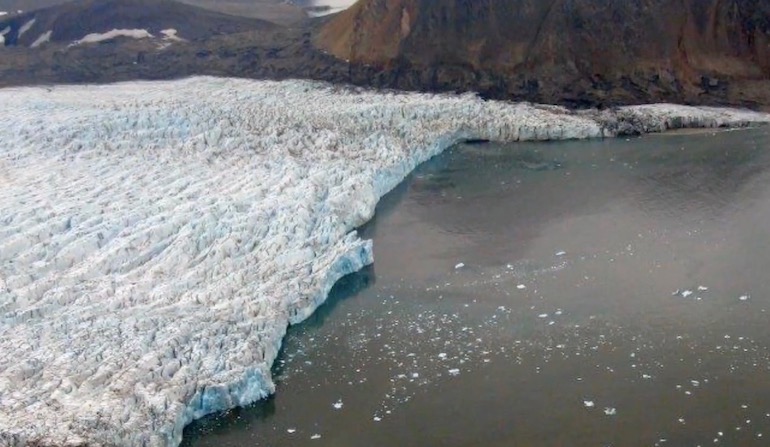 Evolution
Evolution
Slate on Evolution’s “Third Way”: The Sound of a Glacier Melting

Given climate worries, I don’t mean to make light of melting glaciers. But the image is an apt one for a species of article we see in unlikely places that give evidence of the Darwin Glacier giving way to freer thoughts about evolution. Here’s what an actual glacier sounds like as it melts:
Kind of musical, isn’t it? Compare it to this from John Favini, writing for Slate of all places. Favini is a University of Virginia anthropology PhD student, “interested in climate change, environmental politics, and science as a cultural domain.” I’m interested in “science as a cultural domain,” too. And here’s a great illustration of how the culture changes. Favini thinks that solving the problem of climate change may depend on recognizing the vital place of collaboration in nature: “Scientists are slowly understanding collaboration’s role in biology, which might just help liberate our collective imagination in time to better address the climate crisis.”
I’m not going to pass judgment on that, but check out this remarkable paragraph. From “What if Competition Isn’t As ‘Natural’ As We Think?”:
Put simply, life is beginning to look ever more complex and ever more collaborative. All this has fractured Western biology’s consensus on Darwin. In response to all these new insights, some biologists instinctively defend Darwin, an ingrained impulse from years of championing his work against creationists. Others, like [Lynn] Margulis herself, feel Darwin had something to offer, at least in understanding the animal world, but argue his theories were simplified and elevated to a doctrine in the generations after his passing. Others are chartering research projects that depart from established Darwinian thinking in fundamental ways — like ornithologist Richard Prum, who recently authored a book on the ways beauty, rather than any utilitarian measure of fitness, shapes evolution. Indeed, alongside the research I have explored here, works by scientists like Carl Woese on horizontal gene transfer and new insights from epigenetics have pushed some to advocate for an as-yet-unseen “Third Way,” a theory for life that is neither creationism nor Neo-Darwinian evolution. [Emphasis added.]
The old face of the evolution establishment is a haughty British scientist-atheist icily scolding a proponent of intelligent design on how he can’t be a “real scientist,” simply by virtue of his entertaining the thesis of teleology in biology. In the old, ice-encased perspective, there was no “fractured consensus on Darwin,” no dubious “ingrained impulse” to defend Darwinian theory, no cause to “depart from established Darwinian thinking in fundamental ways,” no need for a “Third Way.”
If you Google “Third Way,” the first two entries point to the group of evolutionary dissenters themselves, led by James A. Shapiro, Denis Noble, and others. The third entry is an article here at Evolution News welcoming them to the evolution debate. So even recognizing the existence of such an alternative path, and seeing it as a serious alternative, plants you well outside the establishment’s orthodoxy. Further down on the search list is a representative opinion from an evolutionary iceman, atheist biologist Jerry Coyne, “Should there be a ‘Third Way’ of evolution? I think not.”
A piece like this from Slate, not what you’d think of as a publication likely to be friendly to Darwin doubting, is noteworthy. What’s that sound I hear? Is it the music of melting glacier ice?
